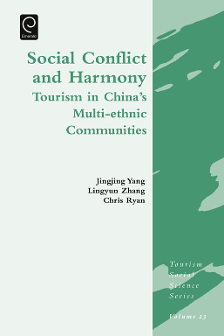
Acknowledgments
Social Conflict and Harmony: Tourism in China’s Multi-Ethnic Communities
ISBN: 978-1-78441-356-9, eISBN: 978-1-78441-355-2
ISSN: 1571-5043
Publication date: 6 June 2016
Citation
Yang, J., Ryan, C. and Zhang, L. (2016), "Acknowledgments", Social Conflict and Harmony: Tourism in China’s Multi-Ethnic Communities (Tourism Social Science Series, Vol. 23), Emerald Group Publishing Limited, Leeds, pp. 235-236. https://doi.org/10.1108/S1571-504320150000023019
Publisher
:Emerald Group Publishing Limited
Copyright © 2016 Emerald Group Publishing Limited
There are so many people to whom the authors owe debt of gratitude. We wish to thank them for their encouragement and care throughout this journey. In the first instance, our deepest appreciation goes to the editors Professor Liping Cai and Professor Jafar Jafari for their valuable comments and insightful advice. Our warmest thanks to Mr. Simon Linacre, Mr. Daniel Berze, and Ms. Rebecca Evans from Emerald for their patient guidance and tremendous support. Jingjing extends her thanks to International Journal of Contemporary Hospitality Management Editor-in-Chief Professor Fevzi Okumus who awarded her the 2012 Emerald/EFMD Outstanding Doctoral Dissertation Award and helped her establish contact with Rebecca Evans with the book proposal.
Jingjing would also personally like to say thank you to many friends in Kanas, China who provided tremendous help and assistance during Jingjing’s fieldwork there. Without their kind help, Jingjing could not have finished this project, and certainly never have survived in the community in the harsh winter. Many thanks go to the staff members of the Kanas Scenic Area Administrative Committee who provided Jingjing with information, assistance, support, and care; they are Kang Jian, Wang Haifeng, Zhang Changqing, Cuijun, Zhang Baoping, Li Hua, Zhao Xiaoxia, Ma Xiaoyong, Suolunge, Yang Changzhao, Zhang Hongxiang, Buyun, Maxia among others. Sincere thanks to the local people whose kindness and hospitality made Jingjing’s life a very unforgettable experience. They are Zuoerkete, Gumei, Ashan, Mengke Cahan, Kuobiesi and his wife, Jialibieke, etc. Jingjing also wants to thank many friends there, including Xiaoou, Zhang Jun, Dagezi, Shijianbin, and others. The data provided by the people in Kanas constitutes the fundamental of this book. Drinking is the best way to express appreciation in Kanas, and Jingjing would like to visit Kanas again and get drunk repeatedly to express her deep gratitude to each person.
This research obtained the financial support provided by the Chinese Government Award for Outstanding Self-Financed Students Abroad. Jingjing wishes to extend her appreciation to the Chinese government and the Chinese Embassy in New Zealand.
- Social Conflict and Harmony: Tourism in China’s Multi-Ethnic Communities
- Tourism Social Science Series
- Social Conflict and Harmony: Tourism in China’s Multi-Ethnic Communities
- Copyright Page
- Preface
- Introduction
- Social Conflict and Tourism Development
- Tourism Development in China
- Data Collection in China
- Conflict Created Group-Boundaries in Tourism Development
- Hostility and Tensions in Conflict Relationships
- In-Group Conflict and Group Structure
- Conflict with Out-Group and Group Structure
- Conflict—the Unifier
- Conclusion
- References
- Acknowledgments
- About the Authors